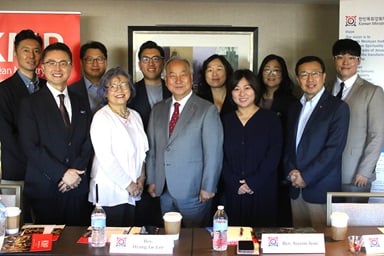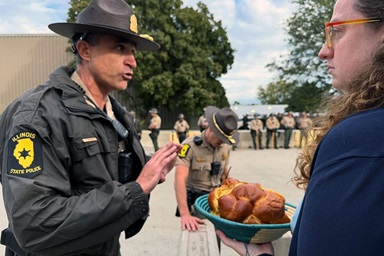Key points:
- The Northern Illinois Conference had sued a breakaway group claiming to be an independent church over possession of the Naperville Korean United Methodist Church property.
- The group had withdrawn from the disaffiliation process required by the Book of Discipline before changing the locks and keys to the church building and barring the remaining congregation members, newly appointed pastor and conference staff from entering.
- The remaining members of Naperville Korean United Methodist Church returned for a Palm Sunday service, which was the first worship service in the building in nearly 10 months.
The Northern Illinois Conference has resumed possession of Naperville Korean United Methodist Church’s property after a judge’s ruling, the conference announced.
Under a temporary injunction on March 21, Judge Anne Therieau Hayes, an associate judge on the Eighteenth Judicial Circuit Court in Illinois, ordered the return of the property seized by a breakaway group from Naperville Korean United Methodist Church. The final decision will come with future court action.
Church leaders said this was a meaningful step in moving forward from a conflict between the Northern Illinois Conference and the breakaway group over who owned the church property.
The remaining members of Naperville Korean United Methodist Church returned to their church on March 24 for a Palm Sunday service, the first worship there in nearly 10 months.
On May 25, 2023, the Northern Illinois Annual Conference Board of Ordained Ministry terminated the ordination process in the elder’s track for Kihwan Choi, a licensed local pastor then, and the conference discontinued his appointment to Naperville Korean United Methodist Church.
Choi and a breakaway group from the Naperville Korean congregation unilaterally ended the disaffiliation process with the Northern Illinois Conference on May 28, claiming to have become an independent church. They then changed the locks and keys to the church building and barred the remaining congregation members, the newly appointed pastor and conference staff from entering.
After the Northern Illinois Conference sent several warning notices and received no response from the breakaway group — who occupied the church for more than four months after May 2023 — the conference filed a formal lawsuit on Oct. 10, seeking the return of the property and funds, which resulted in the temporary injunction on March 21.
The Book of Discipline of The United Methodist Church provides that if a local church wishes to leave The United Methodist Church, it must apply the provisions for disaffiliation and that the annual conference is responsible for processing a local church’s disaffiliation.
The 2019 special General Conference passed Paragraph 2553 to allow churches in the United States to disaffiliate from the denomination for reasons of conscience regarding a change in the requirements and provisions of the Book of Discipline related to the “practice of homosexuality or the ordination or marriage of self-avowed practicing homosexuals” after satisfying the terms and conditions for that disaffiliation established by the applicable annual conference. This provision expired on Dec. 31, 2023.
The provision provided a limited avenue for local churches to deviate from The United Methodist Church’s centuries-old trust clause, which states that the property of a local church is held in trust for the benefit of the entire denomination.
Since 1797, The United Methodist Church and its predecessors have maintained a policy of holding all church property “in trust” for the missionary purposes of the entire denomination. The trust clause provides that church property is owned by the local church but is to be used for the benefit of the denomination, and secular courts have respected and upheld this policy, including in a ruling of a Wisconsin federal judge that dismissed a property lawsuit by a church in the Wisconsin Annual Conference in 2022.
Paragraph 2553 provided that a church seeking to disaffiliate had to fulfill financial and procedural obligations to be released from the trust provision, and states that annual conferences “may develop additional standard terms that are not inconsistent with the standard form” of the paragraph.
Subscribe to our
e-newsletter
Since Paragraph 2553 became effective in 2019, nearly 7,700 churches, or about 25% of the 30,500 churches in the United States, have disaffiliated from The United Methodist Church.
The Naperville Korean United Methodist Church initially entered into a disaffiliation process agreement with the Northern Illinois Annual Conference according to Paragraph 2553. The church agreed to pay a total of $1,429,457.98, submit a disaffiliation application to the annual conference, and complete the disaffiliation process approved by the annual conference.
After the breakaway group unilaterally ended the disaffiliation process, the conference cabinet recommended the closure of the church to the conference according to Paragraph 2549.3(b), and the Northern Illinois Annual Conference approved the closure of the church during its meeting in June.
Paragraph 2549.3(b) states that the real and personal, tangible and intangible property of the local church shall immediately vest in the annual conference board of trustees upon the decision of the presiding bishop, the majority of the district superintendents, and the appropriate district board of the church location and building.
Asbury Korean United Methodist Church, planted in 1976 by the Rev. Paul C. Chang, and DuPage Korean United Methodist Church, planted in 1981 by the late Rev. Samuel Son, were the churches originally ministering to Korean Americans living in Chicago’s west suburban area.
In 2008, the Asbury and DuPage churches merged to become Naperville United Methodist Church. The Asbury and DuPage properties — which were granted free of charge from the Northern Illinois Conference in 1976 and the early 1990s, respectively — sold for a total of $2.75 million. That money, along with a $1.5 million loan from the conference, was used to build the Naperville church.
Dongsun Kim, one of the leaders of the breakaway group, expressed his deep sadness after the temporary injunction was issued.
“We were too naive about the church law. We did not know anything about Paragraph 2553,” he said. “Pastor Kihwan Choi misled and gave us false information that we could leave the denomination after paying 10 years’ pension and apportionments, which was about $240-$250,000, and then we could own the church, build and hire a pastor by ourselves.
“He did not inform us that the bishop promised us that he would not appoint gay pastors to Korean churches, nor is there a trust clause,” Kim added. “It has been a very painful process that divides us.”
“I share with the people of the Naperville Korean United Methodist Church their joy in returning to their building,” said the Rev. Jeff Bross, Prairie Central District superintendent. “They have many dreams for expanding their ministry to all of their neighbors, and they will make good use of the building for their ministry.”
Bross said that the judge’s ruling had not been expected so close to Holy Week.
“It makes the hope of Easter even more tangible,” he said. “We continue to hold in prayer for those who chose to separate from us. All are welcome to the continued ministry at any of our churches.”
Chang said he was relieved by the ruling.
“Justice prevailed. I thank God that the truth and righteousness were brought to the trial,” he said. “We were born empty-handed, and we will leave this world empty. The same is true of the church property that’s not ours, but God’s. We have to focus on glorifying God with it.”
Naperville church leaders expressed not only their joy but also their concerns for the future and ministry.
Dr. KP Chung, a longtime leader of Naperville, said he wants to see reconciliation among all the members, including the breakaway group, for the sake of the church as Christians.
“After almost 10 months of being a refugee since May 28, 2023, it was sweet to be in my father’s house,” he said.
Chung described being excited and happy, but also said he feels a commitment to pursue peace in the church.
“The real restoration happens with the return of the breakaway members. We will be committed to being open to everyone, inclusive and welcoming. We want to be united,” he said. “The best celebration for us happens when we see the lost return to father’s house.”
The Rev. Jung Nam Kwak, a retired elder serving as interim pastor of Naperville, also expressed the need for healing and reconciliation among the congregation.
“I know this is not the end of the trial, but it is very meaningful, and I was happy to be able to return to the home church for Palm Sunday service,” Kwak said. “I hope reconciliation and healing will take place among us, and that we will continue to witness the gospel of the Lord to the Korean community in Naperville.”
Bishop Dan Schwerin, episcopal leader of the Northern Illinois Conference, said he was grateful for the temporary injunction.
“It was a painful decision to resort to the legal system to help resolve our conflict with a group from one of our churches after attempts to work with them under church rules failed,” he said. “Now we are looking forward and, with God’s grace, discerning ways to renew a Korean-speaking ministry in that area.”
Kim is director of Korean and Asian news at United Methodist Communications. Contact him at 615-742-5470 or [email protected]. To read more United Methodist news, subscribe to the free Daily or Weekly Digests.




